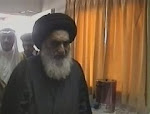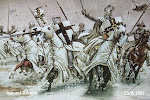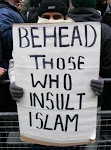Islam is at war with the West. The West cannot win this war unless it defines the enemy. Europe has all but surrendered to Islam, and America is in the process of doing so because their common enemy has not been defined. The same may be said of Israel, whose leaders are afraid to name the same enemy.
Using such terms as “Islamism,” Islamic fundamentalism,” “extremist Islam,” “radical Islam,” “militant Islam,” “political Islam,” “IslamoFascism” fails to expose the unique political and theological nature of the enemy, and this failure is a strategic error.
Henri Boulad, an Egyptian Jesuit and specialist in Islam, boldly states, “Islamism is Islam.” This statement, he says,
is perfectly consistent with history and geography, with the Qur’an and the sunna, with the life of Muhammad and the evolution of Islam, with what Islam says about itself. I reject the position of people—Muslims or Christians—who bury their heads in the sand like ostriches … refuse to see the situation objectively, or take their wishes for realities, on behalf of dialogue and tolerance.
The Qur’an exalts the Muslim who “slays and is slain” for Allah (Sura 9:111). Islam, therefore, is a religion of death.
Defining Islam exposes you to the canard of racism. It can also lead to violent backlash. However, since Islam is waging war against the West, the West will lose this war if its political and intellectual leaders fail to educate public opinion about the true nature of the enemy.
One way to avoid the issue is to speak of “Muslim moderates.” That there are such Muslims is not strategically relevant in a time of war. Many Muslim moderates, as Daniel Pipes admits, are latent “extremists.” He estimates that 150 million Muslims support Jihad. Some estimate more than 300 million, equivalent to the population of the United States! Islam has a 1,400-year history. The West has taken a holiday from history—even from 9/11. However Islam is defined, Muslims have slaughtered about 270 million “infidels” since the time of Muhammad.
The question for statesmen is: how to name the enemy and control the untoward passions that may follow? Euphemisms will not do when the survival of civilization is at stake. We are confronted by an enemy more dangerous than Nazism. Such democratic concepts as “conflict resolution,” “proportionality” (in the use of force), and avoidance of “collateral damage” guarantee the victory of the wicked. Against Islamic ruthlessness, the humanism of liberal democracy is obsolete.
To clearly define the enemy, I will cite and paraphrase passages from a must-read book, Faith, Reason, and the War Against Jihadism (2007), by the Catholic theologian George Weigel.
1) Jihadism is rooted in “The notion that there are ‘no innocents’—that the enemy is ‘guilty’ simply by reason of drawing breath …’” This generates “a strategy of open-ended mayhem based on the radical dehumanization of the ‘other.’” Jihadism murders human reason.
2) The Bible calls on the faithful to use their reason in understanding its teachings. Abraham, Moses, the prophets wrestle with the meaning of God’s purposes and commandments. Islam’s holy book, by contrast, is described by an influential Egyptian Islamic activist in these terms: “The Qur’an for mankind is like a manual for a machine.”
3) Richard John Neuhaus defines jihadism as “the religiously inspired ideology [which teaches] that it is the moral obligation of all Muslims to employ whatever means [are] necessary to compel the world’s submission in Islam.” For example, using Arab children as human bombs to kill Jews. Israel’s conflict with Palestinian jihadists is not about territory; the ultimate issue is theological.
4) The notorious Sayyid Qutb, an Egyptian who taught global jihad, declared, “[Our struggle] is not about territory but about truth and which truth would prevail in the world.” He scorned the idea of “three monotheistic faiths.” “For him, other religions were not simply mistaken, they were evil, ‘filth’ to be expunged.”
5) The French philosopher Alain Besancon has said, “Efforts to engage in ‘dialogue’ with Muslims have been set on a mistaken course.” Unlike Christianity, Islam has failed to adapt to the Enlightenment or the Age of Reason. The Taliban religious police posted an instruction which said, “Throw reason to the dogs—it stinks of corruption.”
[It seems that both Binyamin Netanyahu and Barack Obama have also thrown reason to the dogs, since one is eager to meet with Palestinian Authority president Mahmoud Abbas, who exalts homicide bombers, while the other is eager to meet with Iranian president Mahmoud Ahmadinejad who intones death to America.”]
6) Weigel says that a Muslim leader who will not condemn suicide/homicide bombing publicly and with the perpetrators condemned by name, is not a leader with whom reasonable people can be in serious conversation. How are we to deal with state-sponsored jihadism?
7) Weigel warns that “deterrence strategies are unlikely to be effective, because it is almost impossible to deter those who are committed to their own martyrdom.” If deterrence is not a realistic option, then regime change is the only alternative, however difficult.
8) The trouble is that regime change runs against the secular religion of our times, relativism. Marcello Pera, former president of the Italian Senate, said: “Europe is infected by an epidemic of relativism. It believes that all cultures are equivalent. It refuses to judge them, thinking that to accept and defend one’s own culture would be an act … of intolerance … an anti-democratic, anti-liberal, disrespectful attitude toward the autonomy of other populations and individuals.”
9) But as Weigel rightly observes, cultural self-confidence is indispensable to victory over Jihadism. Alas, relativism is leading Europe to self-imposed dhimmitude. “Piglet” mugs have disappeared from certain British shops. Winnie the Pooh character has offended Muslim sensibilities. So, too, has Burger King ice cream twirls, which reminds some Muslims of Arabic script from the Qur’an. These laughable examples are symptomatic of the extent to which Europeans have become dhimmis in their own countries. But infinitely more is involved in Islam’s ascendancy in Europe.
10) Islam’s deep theological structure renders the notion of “three Abrahamic faiths” ultimately misleading in understanding Islam’s own faith and practice—particularly if the notion of “three Abrahamic faiths” “is understood in the popular imagination as a matter of three equivalent legs propping up a single monotheistic stool.”
11) Islam and its replacement theology, which has never fully liberated itself from Arab paganism, has a built-in tendency to set in motion an implacable and open-ended conflict with all other religions. Islam leaves no room for genuine dialogue and respect for human life.
12) “Alain Besancon takes us further into the matter when he draws yet another important distinction between Judaism and Christianity, on the one hand, and Islam, on the other: ‘Although Muslims like to enumerate the 99 names of God, missing among the list … is ‘father’—i.e.. a personal God capable of a reciprocal and loving relationship with men. … If God is not our ‘father,’ then it is difficult to imagine the human person as having been made ‘in the image of God.’” Is it any wonder that Jihadism is based on the radical dehumanization of the “other”?
13) Dr. Weigel refers to Islam’s “defective theology.” Which I enlarge upon in my book A Jewish Philosophy of History. Islam’s deity leaves no room for free will.
14) There remains the question of what must the West do in this world-historical struggle with Islam? Space limits me to consider only one of Dr. Weigel’s proposals. “Global jihadism,” he says, “would not be the threat it is had the West not transferred some $2 trillion in wealth to the Arab Islamic world since World War II—which, among other things, has allowed Saudi Arabia to spend an estimated $70-100 billion spreading Wahhabi doctrine and its summons to jihadic sedition and violence all over the globe.”
15) The devil, of course, is worldwide dependence on oil. Experts therefore propose a shift to more fuel-efficient transportation. They speak of plug-in hybrid vehicles and the use of biofuels and other alternative fuels that can be produced from inexpensive and widely available feedstocks. Apparently, the technology is available to produce a flexible fuel vehicle capable of going 500 miles on single gallon.
16) What is urgently needed now, however, is public enlightenment about Jihadism; and those most in need of enlightenment are America’s ruling elites, including president-elect Barack Obama.
-->
12 years ago






















No comments:
Post a Comment